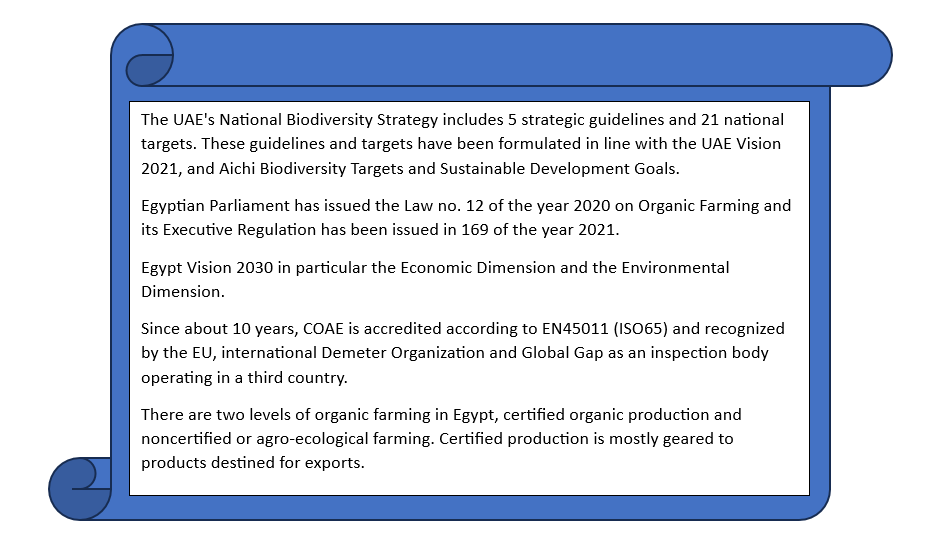MENA BIO FERTILIZER MARKET SEEN SOARING 12.75% GROWTH BY 2030, PROJECTS UNIVDATOS MARKET INSIGHTS
- Vikas Kumar
- June 21, 2024
- AGRICULTURE, NEWS
- MENA Bio Fertilizer Market, MENA Bio Fertilizer Market forecast, MENA Bio Fertilizer Market growth, MENA Bio Fertilizer Market share, MENA Bio Fertilizer Market trends
- 0 Comments
Key Highlights of the Report:
- AfrONet initiated the process of establishing a National Organic Agriculture Movement in Egypt through a local organisation. It is anticipated that by 2023, Organic Egypt will be transformed into a national organic movement (NOAM) to handle organic activities in Egypt and collaborate with the Moroccan Interprofessional Federation for Organic Agriculture FIMABio.
- In 2005, the Ministry of Environment, Water and Agriculture (MEWA) adopted the Organic Agriculture Law to support the organic sector. The government established a functional institutional framework by creating:
- the Department of Organic Production as the competent authority within MEWA,
- the Saudi Organic Farming Association, as a private, independent non-profit organisation incorporating all private actors related to organic agriculture under one umbrella, and
- − the National Center for Organic Agriculture as a research institute.
- In Saudi Arabia- Local organic production has increased by more than 130 percent between 2018 and 2021, exceeding 105’000 tonnes in 2021. The organic agricultural land has increased by more than 45 percent and reached 27’100 hectares with 400 farmers in 2021.
- Syria and Iran mainly rely on domestic production, with 10% and 37% of their grains being imported, respectively. Egypt, Iraq, and Morocco import around half of their grains, with import percentages of 41%, 42%, and 44% respectively. On the other hand, countries like Bahrain, Kuwait, UAE, Qatar, and Yemen have a higher dependency on imports, as the majority of the grains they consume are imported.
According to a new report by Univdatos Market Insights, The MENA Bio Fertilizer market was valued at USD 78.38 Million in 2022 and is expected to grow at a strong CAGR of around 12.75% during the forecast period (2023-2030) to the growing awareness and emphasis on sustainable agriculture practices drive the demand for biofertilizers. For instance, in 2023, According to the Research Institute of Organic Agriculture, Saudi Arabia has increasingly turned its attention to sustainable agriculture and environmentally friendly farming practices. In 2005, the Ministry of Environment, Water and Agriculture (MEWA) adopted the Organic Agriculture Law to support the organic sector. Adding to this, the raising global population and the need for enhanced agricultural productivity have led to a higher demand for biofertilizers. As per the Food and Agriculture Organization, in 2022, in the middle east, 28% (84 million) of the total population (296 million) depend on agriculture, but it accounts to only 13% of the GDP. These products help improve soil fertility and crop yield, ensuring food security and sustainable agricultural development.
For More Detailed Analysis in PDF Format, Visit- https://univdatos.com/get-a-free-sample-form-php/?product_id=54288
The report suggests that bio fertilizer resources in Middle East and North Africa (MENA) region had a significant impact on the bio fertilizer industry in the MENA region. Some of the ways in which this impact has been felt include:
- In April 2020: Abu Dhabi Investment Office (Adio) financed USD 100 million (Dh367m) to bring four agriculture technology companies to the emirate as part of government efforts to attract high-skilled talent and cutting-edge research.
- On December 13, 2023: Novozymes and Chr. Hansen recently revealed their upcoming brand identity as ‘Novonesis’. This new name signifies a groundbreaking era of biosolutions, as Novonesis seeks to unlock the immense potential of biological solutions and create substantial value for stakeholders and society as a whole. This announcement represents a significant milestone in the process of merging the two companies into a unified entity.
Apart from this, in recent years, several governments in the Middle East and North Africa have implemented policies and provided funding support to enhance the growth of the Bio fertilizer industry. Some examples include:
Conclusion
In conclusion, the adoption of bio-fertilizers in the MENA region represents a crucial step towards sustainable agriculture. As the demand for food continues to rise, and environmental concerns become more prominent, the role of bio-fertilizers in improving soil fertility and reducing the ecological footprint of agriculture cannot be overstated. Governments, farmers, and the private sector in the MENA region must collaborate to promote the widespread adoption of bio-fertilizers. Investments in research and development, education, and infrastructure for bio-fertilizer manufacturing will contribute to building a more resilient and sustainable agricultural system in the region.
Key Offerings of the Report
Market Size, Trends, & Forecast by Revenue | 2023−2030
Market Dynamics – Leading Trends, Growth Drivers, Restraints, and Investment Opportunities
Market Segmentation – A detailed analysis by type, by cultivation, and end-user
Competitive Landscape – Top Key Vendors and Other Prominent Vendors

